Rear area postal service
Administrative mail
Each Army had a Civil Administration (Zivilverwaltung) responsible for the legal and economic management of the French rear areas (zones of communication). The Civil Administration of the 6th Army was established on December 14, 1914, with Baron Hans von Welser as its head. Its offices were located at 47 rue de Paris in VALENCIENNES (Crédit Lyonnais headquarters). By the end of 1916, the Zivilverwaltung moved to 12 rue de la Halle in VALENCIENNES.
Its scope of activities included:
Justice and administration : passports, establishment of local authorities, judiciary, and education.
Currency and credit : Regulation of the issuance of requisition vouchers, replacement of means of payment, and exchange of requisition vouchers for currency.
Agriculture: Organization and acceleration of harvesting and field work by municipality. Grouping and provision of agricultural machinery, including fuel and oil; collection and distribution of field produce; management of mills and bread production. Collection of hay and straw, baling, distribution to the troops, storage in warehouses, and production of chopped straw.
Forestry.
Civilian food supply: collection of grain, importation, and rationing of foodstuffs.
Mining and coal supply: Oversight and continuation of coal mine operations. Monitoring of explosives; delivery of requested coal to troops and then to municipalities for public and private needs; transportation to industrial plants operated for the army; promotion of coking plants and briquette factories for railway use.
Transport: Coordination with railways and inland waterways.
Electricity: Reactivation of power plants and distribution of electricity.
Metallurgy: Inventory of ores and raw materials (iron, zinc, copper, lead, etc.) in iron and metalworks; shipment to Germany; use of semifinished and finished products (armour plates, steel profiles, corrugated sheets, entrenching tools, wires, nails, etc.).
Supply of horseshoes to the army.
Chemical products: Production of benzole, petroleum, fertilizers, etc.
Leather and hides: Collection and shipment to Germany, except when directly used by troops.
Textile fibres:
a. Seizure and export to Germany.
b. Local processing for army needs.
c. Distribution of finished products or shipment to Germany.
Regarding correspondence to and from this administration, Instruction II c 2580 dated February 17, 1917, issued by the General Quartermaster (Generalquartiermeister), states in point 12:
"12. Administrative censorship took place alongside military censorship:
a) For letters from local public services, civil servants, and members of the clergy concerning official correspondence—where necessary—by senior officials of the Civil Administration [Zivilverwaltung] or their representatives appointed by the Lines of Communication Inspectorate [...]"
The Zivilverwaltung did not cancel postage, as it collected mail that had already passed through the military postal control centre.
Examination marks from the German Civil Administration are rare, despite the significant volume of administrative mail that passed through its system.
The Civil Administration was responsible for enforcing policing regulations and ensuring that the population complied with the decrees of the Lines of Communication Inspector. It also supervised local police forces, municipal authorities, and public services in the occupied regions, while exercising censorship over newspapers, books, theatres, and cinemas.
Additionally, the Zivilverwaltung employed an Intendant (Verpflegungsoffizier) to oversee the supply of provisions and liaise with various food committees within the occupied zone.
VALENCIENNES to LOURCHES (6th Army).
Although it is a service letter, it was controlled militarily on 2 May 1916 ("Geprüft F. Postüberwachungsstelle 6. Armee") and by the intendance officer at the 6th Army Civil Administration (stamp "Verpflegungsoffizier f. d. Civilverwaltung VI.").
VALENCIENNES (6th Army) to MONS (Belgium)
Service letter from the Comité d'alimentation du Nord de la France examined by the intendance officer of the Inspection d'étapes of the 6th Army (stamp "Verpflegungsoffizier f. d. Zivilverwaltung Nordfrankreichs Et. Insp. 6.").
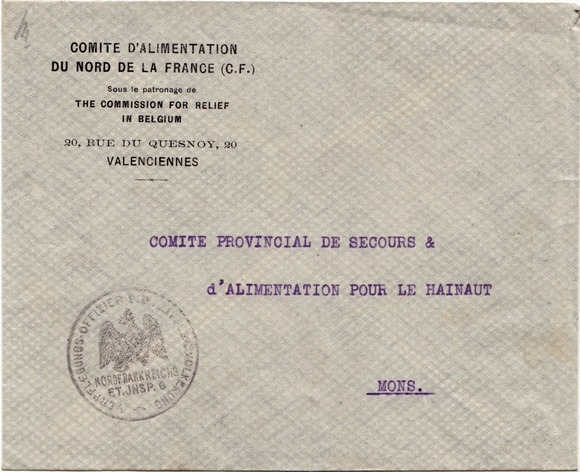

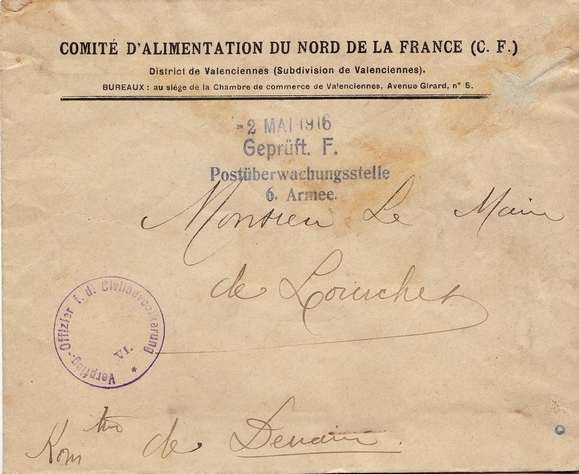

SEBOURG (6th Army) towards VALENCIENNES (2nd Army). Postal censorship carried out by the 6th Army in TOURNAI. Arrived at VALENCIENNES, the Civil Administration carried out a new control and applied its paper seal.
The paper seals used as control marks are not very common.
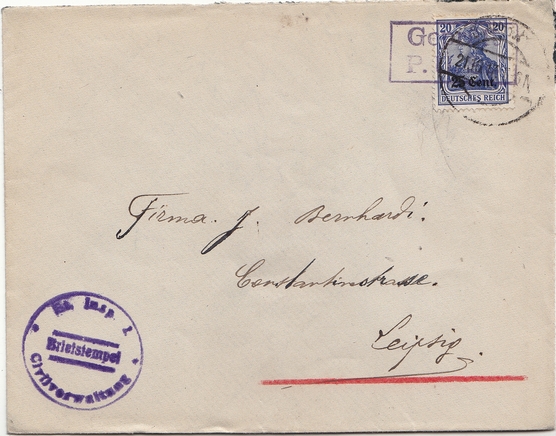

VALENCIENNES (2nd Army) to LEIPZIG (Germany), 21 October 1917.
Postal control by the Postüberwachungsstelle 39 (stamp "Geprüft P.Ü.St.") and administrative control by the Zivilverwaltung (stamp "Briefstempel Et. Insp. 2. Civilverwaltung").
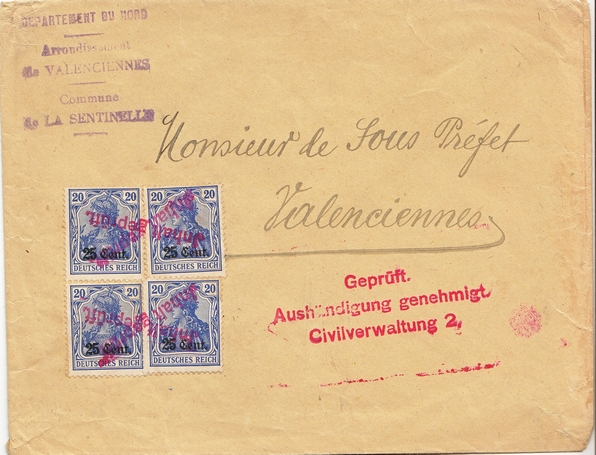

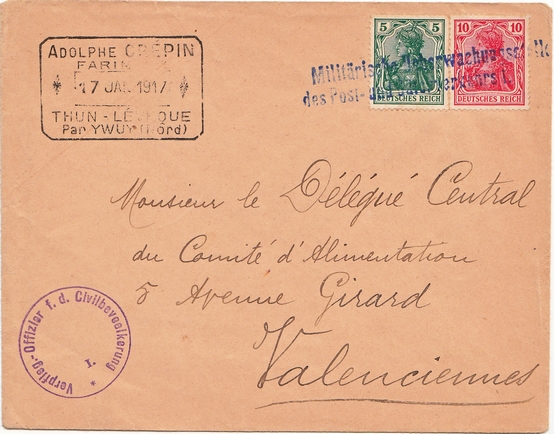

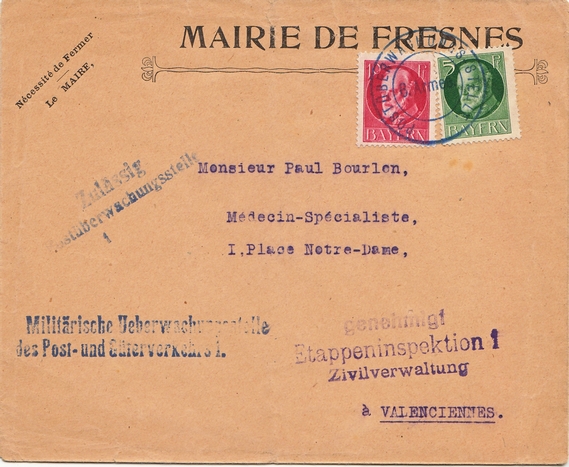

THUN-L'EVEQUE towards VALENCIENNES (1st Army), 17th January 1917. Administrative control by the 1st Army intendant. This officer was in charge of supplies for the municipalities.
FRESNES-SUR-L'ESCAUT (6th Army) to VALENCIENNES (1st Army). After a military examination, this letter was checked by the Civil Administration of the 1st Army in VALENCIENNES (stamp "Genehmigt Etappeninspektion 1 Zivilverwaltung").
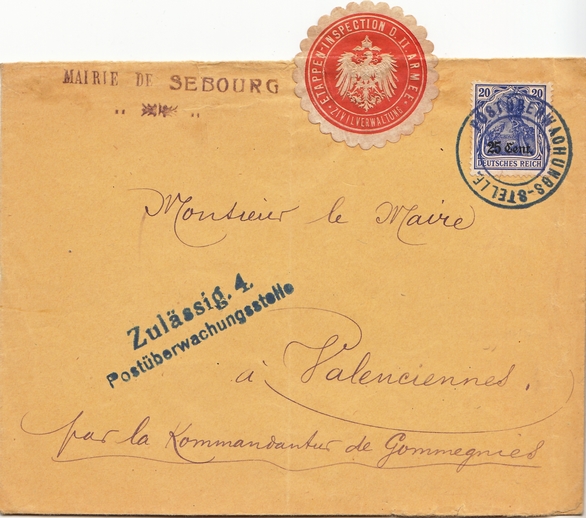

LA SENTINELLE to VALENCIENNES (2nd Army). Control by the Civil Administration of the 2nd Army, control stamp "Geprüft Aushändigung genehmig. Civilverwaltung 2." (Examined routing approved Civil Administration 2.). Postage stamps are cancelled by a mark "Inhalt Geprüft" (contents checked). The postage at 1 Fr corresponds to a weight of 120 g (rates of 20/03/1917).

